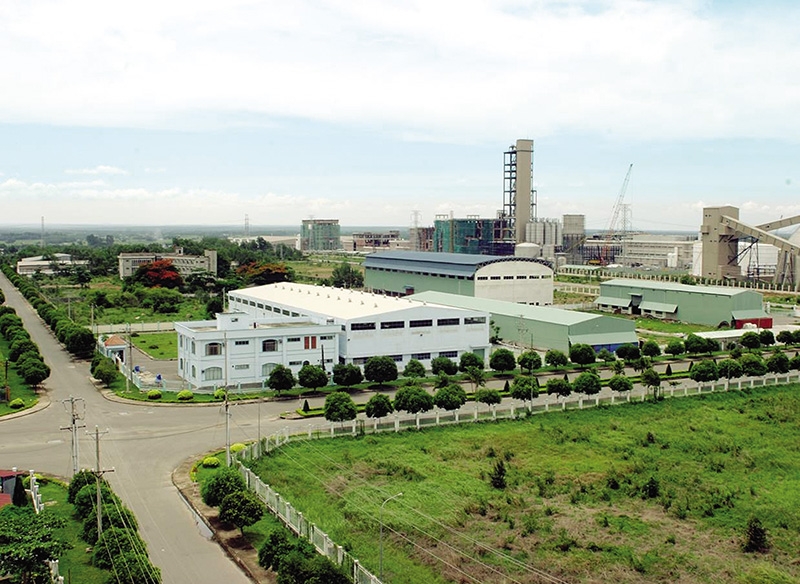The rising star of Ha Nam in FDI arena
 |
| The province continues to improve industrial park-based services across the board |
According to real estate consultants CBRE, the ongoing US-China trade tensions, rising investment flows, and new-generation free trade agreements have had positive impacts on Vietnam’s industrial development.
Leveraging a young workforce at competitive cost amid a stable political standing, Vietnam has been named among the countries posting the fastest development pace.
Compared to several neighbours such as Malaysia, Indonesia, India, and China, Vietnam reports one of the lowest factory construction costs, fetching around $600 per square metre against $700 per sq.m in India, $900 per sq.m in Indonesia and China, and $1,200 per sq.m in Malaysia.
Additionally, with the cost level much more compelling compared to that in big metropolises like Hanoi and Ho Chi Minh City, Ha Nam is proving appealing for foreign direct investment (FDI), partly explaining why the province has become a focus for a slew of firms coming from the likes of Japan and South Korea.
The province alone is now home to 82 Japanese firms and 108 South Korean companies, many of whom have reaped the rewards from conducting business operation there, such as Honda Vietnam, Sumi Ltd., and NMS Ltd.
Ha Nam’s advantages, according to many investors, lie in its proximity to Hanoi and Haiphong port, convenient transport connections with other localities in the region, attractive investment incentives, and an abundant and skilled workforce.
The industrial parks based in the province features a fairly comprehensive infrastructure base such as transport, power, and water supply system, and waste-water treatment stations that perfectly match businesses’ long-term development goals.
As a result, the province has grown into an investment hub in recent years. From 2016 until last month, Ha Nam courted 170 investment projects, 68 per cent of which are foreign-invested. In the first eight months of this year, Ha Nam wooed 66 projects and 38 others increased capital. Total newly-registered and added capital hit $652.6 million.
Le Thi Thuy, Ha Nam Party Secretary, told VIR that the province will maximise efforts to avail of its favourable position, rich land fund, and buoyant prospects for industrial production to drive local economic development.
Along with that, one of the top priority tasks of the province in upcoming months is working on industrial park development to match its sustainable development goals, focusing on solving issues related to the environment, transport infrastructure, waste treatment system, water sewerage, and security.
“In the months ahead, Ha Nam Industrial Park Management Authority needs to scale up efforts to accelerate administrative procedure reform and improve industrial park-based services, particularly the power supply and transport infrastructure provision, thus building a dynamic and professional work style to effectively serve investors’ demands, and from there propelling local industrial development,” said Thuy.
As of September, six out of eight industrial parks in the province can now meet foreign investor demands, covering nearly 1,600 hectares of space, of which about 1,100ha are earmarked for industrial development. Along with advances in power, water, and transport services and infrastructure, related utility services such as housing, supermarkets, and car pick-up for workers have seen remarkable improvements.
Besides these advantages, investment incentive policies have been carried out seamlessly, with strong commitment from the local government.
The province’s management has made good on their promises with investors and businesses, such as ensuring round-the clock power supply to firms, and the granting of investment certificates not exceeding three days.
What the stars mean:
★ Poor ★ ★ Promising ★★★ Good ★★★★ Very good ★★★★★ Exceptional
Related Contents
Latest News
More News
- MAE names big 10 policy wins in 2025 (February 06, 2026 | 08:00)
- US firms deepen energy engagement with Vietnam (February 05, 2026 | 17:23)
- Vietnam records solid FDI performance in January (February 05, 2026 | 17:11)
- Site clearance work launched for Dung Quat refinery upgrade (February 04, 2026 | 18:06)
- Masan High-Tech Materials reports profit: a view from Nui Phao mine (February 04, 2026 | 16:13)
- Hermes joins Long Thanh cargo terminal development (February 04, 2026 | 15:59)
- SCG enhances production and distribution in Vietnam (February 04, 2026 | 08:00)
- UNIVACCO strengthens Asia expansion with Vietnam facility (February 03, 2026 | 08:00)
- Cai Mep Ha Port project wins approval with $1.95bn investment (February 02, 2026 | 16:17)
- Repositioning Vietnam in Asia’s manufacturing race (February 02, 2026 | 16:00)

 Tag:
Tag:




















 Mobile Version
Mobile Version